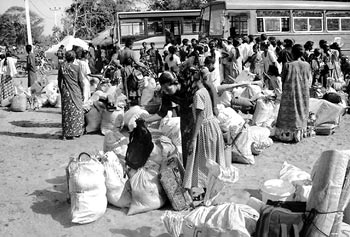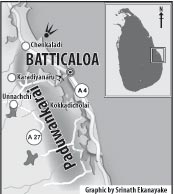
Paduwankarai: Panic-stricken people are yet to see liberationDuring the entirety of the of the military's campaign to clear the East of the LTTE, a refrain on the lips of President Mahinda Rajapaksa and his supporters was that the area was being liberated from the clutches of a murderous, fascist organisation. The campaign, spanning about one year, was concluded officially - and symbolically - with the capture of Toppigala, and resulted in immense losses in both lives and property. However, unlike in the past, this time the government insisted on the expeditious resettlement of displaced populations. We now know why: forthcoming elections make it imperative that populations are resettled so that the ethnic balance in sensitive areas is not upset, and IDP camps do not become havens for political canvassing, or rebel recruitment.
The IDPs, already traumatised by months of war, were forced to resettle in their villages despite un-cleared landmines, poor infrastructure, no prospects of livelihood and, most of all, fear of fresh clashes between the combatants. The government was, however, categorical that protection for resettling populations would be provided by the state. Holding operations in western Batticaloa (Paduwankarai) was handed over to the special task force (STF) and the army. But unfortunately, the military seems to believe that the way the area is pacified is not through hearts and minds operations (whatever drawbacks such operations might have) but through brutal repression. Though the government has allegedly insulated the world outside from the occurrences in western Batticaloa by imposing a news blackout except what its spin doctors turn out on, on-going resettlement and development programmes, there are persistent reports of murder, abduction and alleged rape. At Pattipalai in July, there were reports that Koneswary (44), mother of three children attempted to commit suicide because she was asked to report to an army camp. The need had arisen because one of her children is reportedly a member of the LTTE. After a quarrel, her neighbours had complained to the army about her son. Rather than meet the army, Koneswary tried to poison herself.
Another incident was recorded by the Asian Human Rights Commission: "The AHRC has received information about the gruesome stabbing of a 27-year-old woman (Balasundaram Thavamani) allegedly by army personnel or members of the Special Task Force (STF) in Paduwankarai, Batticaloa. Accordingly, on July 7, several personnel in military uniform had come to the house she was staying and shouted her name. When she failed to respond they stormed inside, and escorted her out. There, they had brutally stabbed her about 12 times in the presence of her mother. The victim succumbed to her injuries shortly" (AHRC 13/Jul/2007). Aid workers also say there are incidents of rape, but the public is yet to make an official complaint. There are two principal reasons for this: fears of reprisal and the age-old barrier that has successfully concealed many depredations on women - shame and family honour. According to reports, the modus operandi of the perpetrators is to note the homes where comely women are resident. After nightfall they approach the house and throw stones at it. When curious or defiant occupants open the door, they are overpowered. The perpetrators are usually in shorts, t-shirts and rubber slippers and unarmed. The environment contributes to this state of affairs too. Most houses are over 100 metres apart, separated by paddy fields or scrub. The distance not only stifles screams of the victims, but provides ready cover for illicit deeds. Furthermore, where IDP returnees live in temporary shelters, the makeshift nature of the structures makes it easy for anyone to enter unannounced on the pretext of conducting search operations. Such incidents and the fear they breed have compelled changes in lifestyle and practices in the area. In many cases, families go to their homes at daytime but gather in one place at night, where the women sleep together in the hope that numbers will provide security. Insecurity has forced men too to make changes. With means of livelihood scarce, men folk in Paduwankarai had revived the traditional practice of working as agricultural labourers in Polonnaruwa. This, however, entails many days' absence from home, which is an invitation to criminals. Therefore, the practice has come to a standstill. Men now sleep in groups, mostly in the open, to be at hand if there is an emergency. With the security situation deteriorating in the less-populous interior of the Pattipalai and Vavunatheevu divisions, some people moved to Kokkaddicholai or Ambalanthurai, which are more densely populated and thereby deemed safer. But that too is not an avenue that is always open. Earlier this month, Manikappodi Sivalingam, a fisherman, was abducted at Kachchaikodi Swamimalai. Fearing a repetition, a group of people from the village had tried to flee to safer areas. But they were accosted by government forces on the way and turned back. While fear and shame are primary obstacles preventing the public from complaining about these incidents, the absence of civil society groups is a major hindrance too. If local and international NGOs or women's organisations were active in the area, they could be a conduit for information and a source of advice to the hapless public. However, with the government denying access to NGOs this is impossible. Similarly, whereas the Sri Lanka Human Rights Commission has a branch in Batticaloa town, there is no instrument by which complaints could be channelled to it from rural Paduwankarai. Another check on the abusive behaviour taking place in the area could be the political party of the Karuna Group - the TMVP - if it chooses to do so. In the past when there were similar complaints, the TMVP managed to bring them to the notice of senior military officials. After the government allegedly engineered a split between Pillaiyan and Karuna, the latter has been successfully defanged and more dependent on the security forces for protection than ever. With the forthcoming local elections for which it would need the security forces' support, the TMVP is prepared to turn a blind eye to people's complaints, though the party will have to go to the victims for votes. A definition of insurgency is the competition between the state and rival political group/s for the control of population. And the most effective form of control is to win the allegiance of the population, which is best obtained by providing protection. If indeed the counterinsurgency war waged in the East to wrest control of the Tamil population from the Tigers, the government is doing very little to win the people's allegiance to sustain it. |
|| Front
Page | News | Editorial | Columns | Sports | Plus | Financial
Times | International | Mirror | TV
Times | Funday
Times || |
| |
Copyright
2007 Wijeya
Newspapers Ltd.Colombo. Sri Lanka. |

